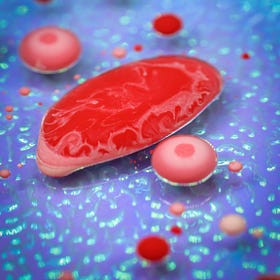The Importance Of Cholesterol In The Human Brain.
We don’t really want to demonize it by calling it “good” or “bad”. It does have its place in the brain’s biochemistry.
The functions that cholesterol does play in the human body are many. We can see that cholesterol is an important component in the structure of the cell membrane. Every living cell in the human body requires cholesterol for its structure to behave in the ways that it ought to be behaving.
Of course, the human brain also comprises cells that do require cholesterol. In fact, the brain does also need cholesterol to create myelin sheaths. These myelin sheaths act as a form of protection for the nerve cells, in a similar way that electrical wires are covered by a layer of insulation to protect the wire from damage and to protect people from being electrocuted.
We can consider the population of these myelin sheaths in the form of a balance equation, much like how we can actually do a balance of the cholesterol in our body:
Understanding How Cholesterol Accumulates In Our Body
The whole problem with health and healthcare these days is that things can get so complicated such that we have no idea how to make any head or tail out of it.
To be very simplistic, we can just think of it as an equilibrium process, where:
Formation-Destruction = Accumulation
The net result of the addition of new myelin sheaths (Formation) subtracted by the elimination of existing sheaths (Destruction) would tell us how much myelin has been Accumulated.
We wouldn’t want the destruction rate to be higher than the formation rate, of course — that’s going to cause a reduction of those myelin sheaths.
Unfortunately, we do know that there are autoimmune conditions where the immune system is (mistakenly) programmed to target and destroy those myelin sheaths — that condition is also commonly known as multiple sclerosis (MS).
MS can be extremely debilitating and paralysing, and there is unfortunately no known cure for it at the moment.
So we might come to the conclusion that MS patients should not go on cholesterol-lowering drugs such as statins any time soon.
After all, statins do inhibit the synthesis of fresh cholesterol in the body, and those myelin sheaths are highly dependent on the presence of cholesterol for remyelination (also known as the synthesis of new myelin or the repair of damaged myelin).
However, there also may be other side questions, such as “do statins cause dementia?” — and that is a valid cause for concern as well.
Do Statins Really Cause Dementia?
Do statins really cause dementia? There have been many differing opinions about what they do. Some claim that it may help to protect one from dementia, while others claim that it may accelerate the onset of dementia.
But statins do cause issues with remyelination, that is for sure — and that is definitely a cause for concern. Because if myelin sheaths are heavily reliant on cholesterol, but the statin drug inhibits the synthesis of fresh cholesterol, then what can be done about remyelination if the cholesterol inhibition remains there?
Nothing much, really.
However, in an interesting twist, statins may actually help to reduce MS issues in ways that are not related to the cholesterol-lowering activity.
Though ideally, we’d want to skip the entire discussion about cholesterol. It’s not that fun to talk about, especially if there are other implications about heart attacks and strokes involved — and there always is a sense of doom and foreboding about having to die by a heart attack or a stroke at any time.
Cholesterol - Does It Spell Doom Or Is It Even Remotely Useful To The Human Body?
Cholesterol is one of those words that people dread discussing as they grow older. Beyond the obvious implications of heart attacks or strokes, the whole issue behind that C word starts at the doctor’s office.
But yet, we do have to be clear that cholesterol is an absolutely necessary building block for the cells in our body — we need it for those cells to function properly. We also do need it for proper brain functions, include the activity of the dopamine and serotonin neurotransmitters.
And we also have to be clear that cholesterol is only a part of the problem in heart disease. How our immune system’s macrophages react towards the cholesterol is a more significant thing, to be perfectly honest!
The Importance Of The Macrophage In The Immune System
The macrophage is one of those immune cells in our body that does quite a fair bit of things without us thinking about it. We’re exposed to so many microbes and virues in the environment on a daily basis, and some of them can penetrate through the skin and mucosal barriers that act as the first line of defence to those foreign invaders:
Do feel free to share this article and hit the “subscribe” button to get more updates about the science concepts in nutrition and health, all deconstructed nicely for your convenient perusal!








